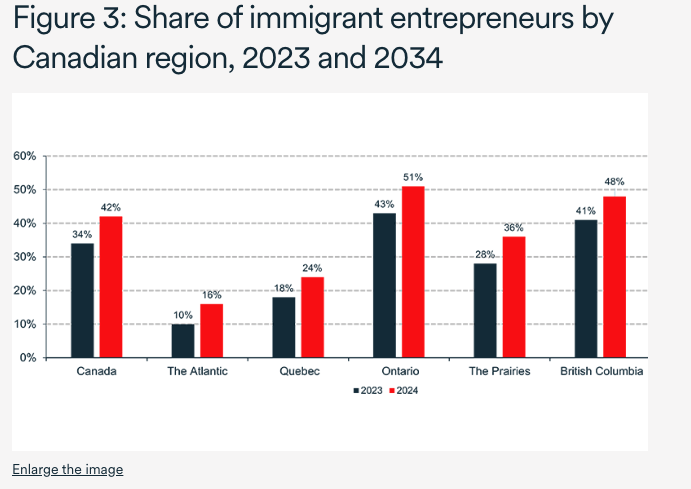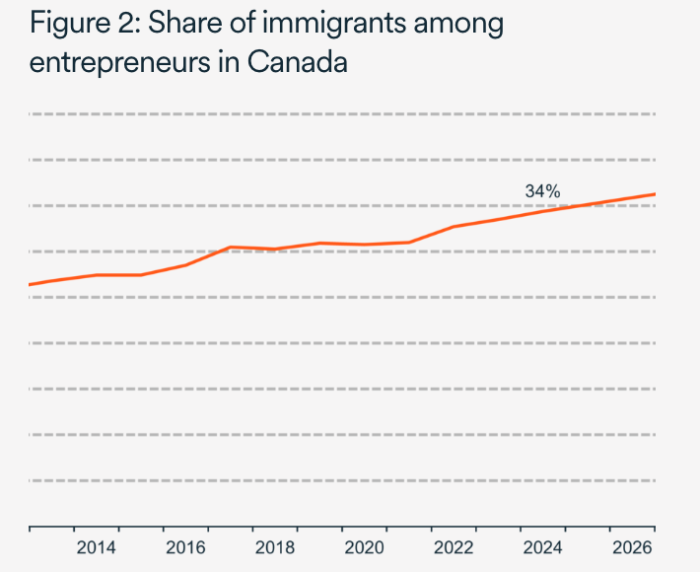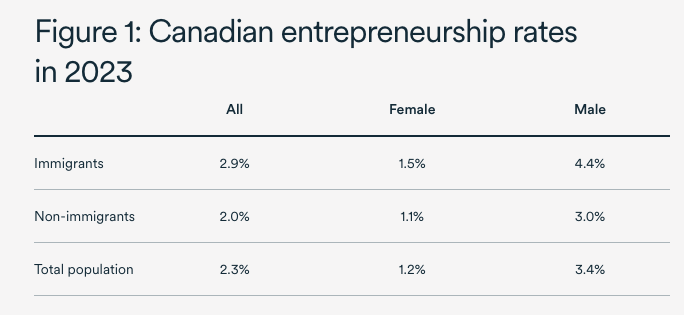As someone deeply involved in the newcomer community, I have seen firsthand how immigrants bring resilience, creativity, and an entrepreneurial spirit to Canada. Many arrive with dreams of building a better future, and for a growing number, that means starting a business. The latest Statistics Canada report shows a significant shift: the share of private incorporated business owners who are immigrants has risen from 25.6% in 2005 to 34.5% in 2022. This isn’t just a statistic; it highlights how integral immigrants have become to Canada’s economy.

But while their contributions are immense, immigrant entrepreneurs also face unique challenges—securing funding, navigating complex regulations, and breaking into business networks. Despite these obstacles, they continue to drive innovation, create jobs, and boost local economies.

The Growing Influence of Immigrant Entrepreneurs
It’s clear that immigrants are shaping the Canadian business landscape, particularly in major cities like Toronto, Vancouver, and Montreal. According to BDC research, over 40% of new business owners in Canada are now immigrants. This growth is not confined to one sector—immigrant entrepreneurs are making an impact in tech, healthcare, retail, and beyond.
Key Statistics:
- Immigrants now represent 34.5% of incorporated business owners, up from 25.6% in 2005.
- A large share of self-employed individuals in Canada are immigrants, and this number continues to grow.
- Many immigrant-owned businesses focus on technology, services, and retail industries.
- These businesses create jobs, employing both immigrants and Canadian-born workers.

The Challenges Immigrant Entrepreneurs Face
While immigrant entrepreneurs are making waves, their journey is not without hurdles. Having worked with many of them, I know that the struggles are real, but so is their determination.
1. Limited Access to Capital
One of the biggest barriers immigrants face is securing funding. Traditional banks often hesitate to lend to newcomers due to a lack of Canadian credit history or collateral. Many end up relying on personal savings, community lending circles, or high-interest alternative lenders.
2. Complex Regulations
Starting a business in Canada means dealing with taxes, licensing, and legal requirements. For those unfamiliar with the system, these complexities can be overwhelming. Even experienced entrepreneurs from other countries find it challenging to adapt to Canadian business laws.
3. Networking Barriers
In business, who you know is often just as important as what you know. Many immigrant entrepreneurs start with few industry connections, making it harder to attract investors, partners, and clients.
4. Language and Cultural Differences
Even in a multicultural country like Canada, language barriers can make it difficult for entrepreneurs to market their business, negotiate contracts, or build relationships with customers.

How Immigrant Entrepreneurs Overcome These Challenges
Despite these difficulties, I’ve seen many entrepreneurs find creative ways to succeed. Here are some strategies that work:
1. Leveraging Community Support
Many immigrant entrepreneurs turn to cultural associations, ethnic business groups, and local non-profits for guidance. Organizations like Immigrant Services Canada, BDC, and Futurpreneur Canada offer valuable mentorship and funding opportunities.
2. Adapting to the Digital Economy
With the rise of e-commerce and online services, many immigrant entrepreneurs have embraced digital platforms to market their products, reach customers globally, and streamline operations.
3. Government and Financial Support Programs
Canada offers several programs to help immigrant entrepreneurs, such as the Startup Visa Program, BDC’s Newcomer Entrepreneur Loan, and regional small business grants. These initiatives provide funding, training, and networking opportunities.
The Economic Impact of Immigrant Businesses
The contributions of immigrant entrepreneurs go beyond just their own success. They play a key role in strengthening Canada’s economy in several ways:
1. Job Creation
Immigrant businesses generate employment, often hiring both skilled and unskilled workers. They also provide jobs for fellow newcomers, helping with economic integration.
2. Innovation and Diversity
By introducing fresh ideas and global business models, immigrant entrepreneurs drive innovation. Their businesses cater to niche markets, expanding consumer choices and strengthening Canada’s competitive edge.
3. Strengthening Trade and Global Ties
Many immigrant entrepreneurs maintain trade connections with their home countries, helping Canadian businesses expand internationally. This boosts exports and fosters global partnerships.
How Canada Can Better Support Immigrant Entrepreneurs
While Canada is already a welcoming place for newcomers, there’s still room for improvement in supporting immigrant entrepreneurs. Here are some key areas to focus on:
1. Improving Access to Financing
Financial institutions need to develop alternative credit assessment methods and offer flexible loan programs for immigrant entrepreneurs. Government-backed microloans and grants can also help fill the funding gap.
2. Simplifying Business Regulations
Providing multilingual support, step-by-step business registration guides, and mentorship programs can make it easier for newcomers to navigate regulations.
3. Expanding Networking Opportunities
More mentorship programs, business incubators, and networking events tailored for immigrant entrepreneurs can help them build essential industry connections.
4. Offering Business and Language Training
Expanding language and business education programs can equip immigrant entrepreneurs with the skills they need to succeed in Canada.
Immigrant entrepreneurs are not just business owners—they are changemakers who contribute to Canada’s economic and social fabric. Their resilience, innovation, and drive have transformed industries, created jobs, and introduced new ideas into the market.
However, their journey is not easy. By addressing financial, regulatory, and networking barriers, Canada can unlock even greater potential among immigrant entrepreneurs. Investing in their success is not just about supporting newcomers—it’s about building a stronger, more inclusive economy for everyone.
As someone who works closely with the immigrant community, I believe that fostering entrepreneurship among newcomers is one of the most powerful ways to drive economic growth and social integration. If we continue to provide the right support, there’s no limit to what immigrant entrepreneurs can achieve in Canada